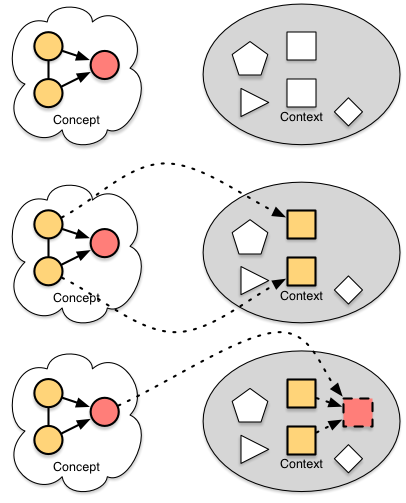 Ok, so I admit that I’m a bit of a pedant (and I hear you, saying “a bit?”). So, when I see categorizations, I should be more accepting of pragmatic approaches. Yet, I still get upset when I see same, when there are clear conceptual breakdowns that could be used instead. My hypothesis is that the good conceptual ones end up making the discriminations (eventually), with perhaps a bit more explanation needed, but…they don’t leave misconceptions as likely to occur. Thus, I’m not sure I’m happy with sloppy thinking.
Ok, so I admit that I’m a bit of a pedant (and I hear you, saying “a bit?”). So, when I see categorizations, I should be more accepting of pragmatic approaches. Yet, I still get upset when I see same, when there are clear conceptual breakdowns that could be used instead. My hypothesis is that the good conceptual ones end up making the discriminations (eventually), with perhaps a bit more explanation needed, but…they don’t leave misconceptions as likely to occur. Thus, I’m not sure I’m happy with sloppy thinking.
One example comes from a textbook I’m reviewing. They’re talking about performance support, and differentiate between EPSS (electronic performance support systems), PSS (performance support systems), and MPSS (mobile performance support systems). First, wouldn’t you start with PSS as the beginning point? The definition used is online and offline. OK, so I can see EPSS as a subset of that. It’s only online, right? So why does it lead the list?
Then, MPSS is a separate category. Isn’t it a subset of EPSS? They note that it is, in fact, an EPSS on a mobile device. So it’s a subset of the first category. You’re going from the middle category to the broader and then to the narrower. That confounds a general trend to follow an order, increasing or decreasing, rather than apparently random. They do note that MPSS can do location-specific things, but that’s also a subset of doing contextually-based things. So, a wee bit facile, it seems to me.
Similarly, I’ve seen a categorization of game technologies, including having spreadsheet-based as a different category from branching. Yes, but spreadsheets are just a mechanism to implement a formal model. It can be in a spreadsheet, or code. Why does the implementation matter? Pragmatically, yes, it matters, but then have spreadsheets and code-implemented as subsets of programmed models. For that matter, you could have an analog implementation of the model!
These are fairly rigorous criteria, whereas all too often I’ll see a list of things (e.g. things you should/never do for X) that aren’t of the same type. Clearly, it’s a marketing person just aggregating a list of things, without a true understanding. I think it’s problematic, however. For one, it’s a missed opportunity to reflect important conceptual distinctions (can you tell I’ve been an educator?). For another, it might lead people to think that being scattershot is ok. Finally, it might undermine the actual development of important categorizations.
I’m willing to believe that, for practical reasons, people do need the pragmatic distinctions. I just feel that the conceptually clear ones can yield that, too. Yes, again, it may take a little more exposition, but isn’t educating folks part of the job too (e.g. good marketing is good customer education)? So, while I feel a wee bit of an old man yelling “get off my lawn”, this is the reason why I struggle with sloppy thinking. Am I off base?




